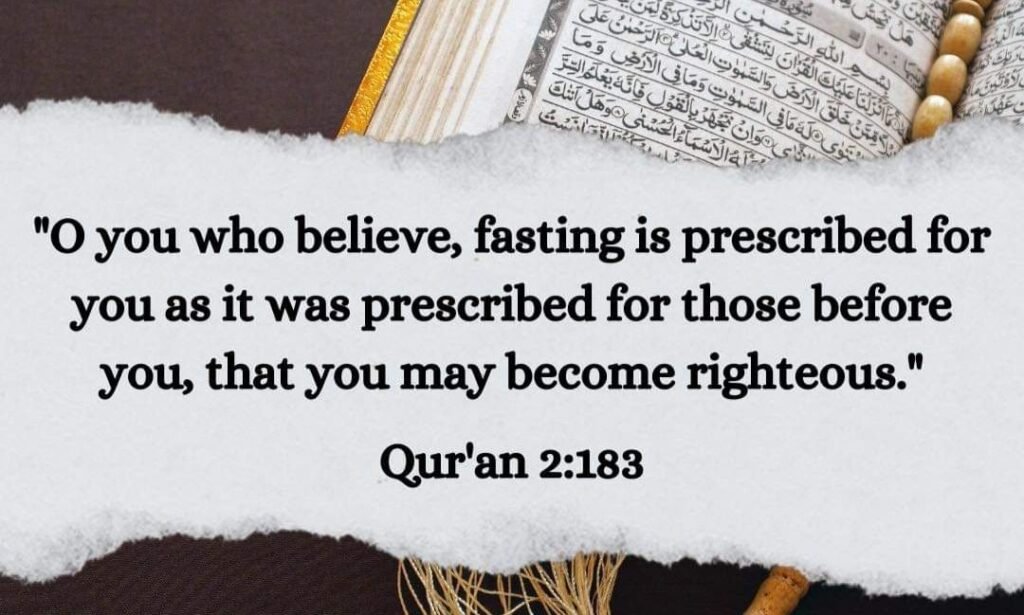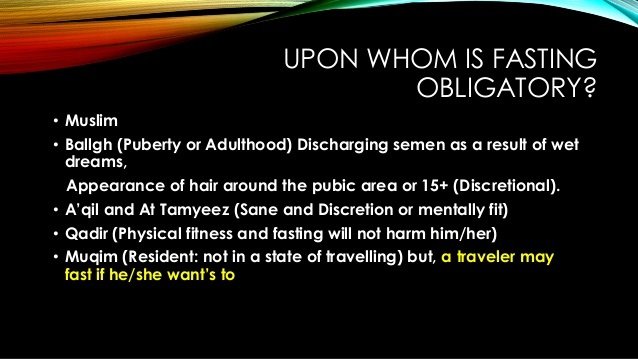𝐖𝐡𝐨𝐦 𝐑𝐚𝐦𝐚𝐝𝐚𝐧 𝐅𝐚𝐬𝐭𝐢𝐧𝐠 𝐢𝐬 𝐎𝐛𝐥𝐢𝐠𝐚𝐭𝐨𝐫𝐲 𝐮𝐩𝐨𝐧?
Mohamad Mostafa Nassar
Twitter@NassarMohamadMR

𝐅𝐚𝐬𝐭𝐢𝐧𝐠 𝐢𝐬 𝐨𝐛𝐥𝐢𝐠𝐚𝐭𝐨𝐫𝐲 𝐟𝐨𝐫 𝐚 𝐩𝐞𝐫𝐬𝐨𝐧 𝐢𝐟 𝐡𝐞 𝐟𝐮𝐥𝐟𝐢𝐥𝐥𝐬 𝐟𝐢𝐯𝐞 𝐜𝐨𝐧𝐝𝐢𝐭𝐢𝐨𝐧𝐬:
1- He/she is a Muslim
2- He/she is accountable (mukallaf)
3- He/she can fast
4- He/she is settled (not traveling)
5- There are no impediments to fasting
If these five conditions are met, then it is obligatory for a person to fast.

Kaafirs=Non-Muslims are excluded from the first condition. The kafir= non-Muslim is not obliged to fast and his fast is not valid.
If he becomes Muslim, he is not obliged to make up fasts from before.
𝐓𝐡𝐞 𝐬𝐞𝐜𝐨𝐧𝐝 𝐜𝐨𝐧𝐝𝐢𝐭𝐢𝐨𝐧:
He should be accountable=(mukallaf). The one who is accountable=mukallaf is one who has reached the age of puberty and is of sound mind, because a minor or one who is insane is not accountable.
The one who is of sound mind is the opposite of one who is insane, which is one who has lost his mind, whether he is insane or feeble-minded. Everyone who has lost his mind, in whatever sense, is not accountable, and he is not obliged to do any of the obligatory duties of Islam, be it prayer, fasting, or feeding the poor; he does not have to do anything at all.
𝐓𝐡𝐞 𝐭𝐡𝐢𝐫𝐝 𝐜𝐨𝐧𝐝𝐢𝐭𝐢𝐨𝐧:
Being able to fast. The one who is unable to fast does not have to fast, because Allaah says (interpretation of the meaning):
“and whoever is ill or on a journey, the same number [of days which one did not observe Sawm (fasts) must be made up] from other days.”
[al-Baqarah 2:185]
𝐁𝐮𝐭 𝐛𝐞𝐢𝐧𝐠 𝐮𝐧𝐚𝐛𝐥𝐞 𝐭𝐨 𝐟𝐚𝐬𝐭 𝐟𝐚𝐥𝐥𝐬 𝐢𝐧𝐭𝐨 𝐭𝐰𝐨 𝐜𝐚𝐭𝐞𝐠𝐨𝐫𝐢𝐞𝐬:
▪️ Temporary inability and
▪️ Permanent inability.
Temporary inability: which is the above-mentioned verse, such as one who is sick but hopes to recover, and the traveler. These people are allowed not to fast, then they must fast when they can on another day to catch up on what they have missed.
Those who are permanently unable to fast, such as one who is sick and has no hope of recovery, or those who are elderly and are unable to fast, are mentioned in the verse (interpretation of the meaning):
“And as for those who can fast with difficulty, (e.g., an old man), they have (a choice either to fast or) to feed a Miskeen (poor person) (for every day)”
[al-Baqarah 2:184]
As Ibn ‘Abbas (may Allah be pleased with him) interpreted it, it refers to the old man and old woman who are not able to fast, so they should feed one poor person for each day.
Every Muslim knows fasting in the month of Ramadan is wajib (obligatory) upon us. But have you ever wondered how this ordainment came? In the same way, do you ever wonder how the other pillars of Islam i.e., Salah=prayer, Zakat=Almsgiving, Hajj=pilgrimage were ordained?
Learning the stories behind the commandments in our deen=our religion is actually an interesting thing. It gives you a whole new level of understanding and appreciation Alhamdulilah=Thank Allah.
So, since Ramadan is just around the corner, here is a little background on the Fourth Pillar of Islam for general knowledge.
- Fasting during the month of Ramadan was made obligatory (wajib) during the month of Sha’ban, in the second year after the Muslims migrated from Makkah to Madīnah.
- The ordainment for fasting was in three stages:
The First Stage: The Muslims were ordered to fast on the day of Ashura (10th Muharram).
Narrated ‘Aisha bint Abi Bakr رضي الله عنهما:
Allah’s Apostle ordered the Muslims to fast on the day of ‘Ashura’, and when fasting in the month of Ramadan was prescribed, it became optional for one to fast on that day (‘Ashura’)
[Sahih Bukhari – Book #31: Hadith #219] *There are many more Ahadith in Book 31 regarding this.
[For more details on the Day of Ashura, please see this post : Do You Know?: The Day of ‘Aashoora]
The Second Stage: The Muslims were given the option of either fasting during the month of Ramadan or feeding a poor person for each day they did not fast, with preference for fasting over feeding.
أَيَّامًا مَّعْدُودَاتٍ ۚ فَمَن كَانَ مِنكُم مَّرِيضًا أَوْ عَلَىٰ سَفَرٍ فَعِدَّةٌ مِّنْ أَيَّامٍ أُخَرَ ۚ
وَعَلَى الَّذِينَ يُطِيقُونَهُ فِدْيَةٌ طَعَامُ مِسْكِينٍ ۖ فَمَن تَطَوَّعَ خَيْرًا فَهُوَ خَيْرٌ لَّهُ ۚ
ۚ وَأَن تَصُومُوا خَيْرٌ لَّكُمْ ۖ إِن كُنتُمْ تَعْلَمُونَ
Observe Saum (fasts) for a fixed number of days, but if any of you are ill or on a journey, the same number (should be made up) from other days. And as for those who can fast with difficulty, (e.g., an old man), they have (a choice either to fast or) to feed a Miskin (poor person) (for every day).
But whoever does good of his own accord, it is better for him. And that you fast is better for you if only you know.
[Surah al-Baqarah – 2:184]
𝐓𝐡𝐞 𝐓𝐡𝐢𝐫𝐝 𝐒𝐭𝐚𝐠𝐞: 𝐅𝐚𝐬𝐭𝐢𝐧𝐠 𝐭𝐡𝐞 𝐦𝐨𝐧𝐭𝐡 𝐨𝐟 𝐑𝐚𝐦𝐚𝐝𝐚𝐧 𝐛𝐞𝐜𝐚𝐦𝐞 𝐨𝐛𝐥𝐢𝐠𝐚𝐭𝐨𝐫𝐲 𝐰𝐢𝐭𝐡𝐨𝐮𝐭 𝐜𝐡𝐨𝐢𝐜𝐞.
شَهْرُ رَمَضَانَ الَّذِي أُنزِلَ فِيهِ الْقُرْآنُ هُدًى لِّلنَّاسِ وَبَيِّنَاتٍ مِّنَ الْهُدَىٰ
وَالْفُرْقَانِ ۚ فَمَن شَهِدَ مِنكُمُ الشَّهْرَ فَلْيَصُمْهُ ۖ وَمَن كَانَ مَرِيضًا أَوْ عَلَىٰ سَفَرٍ
فَعِدَّةٌ مِّنْ أَيَّامٍ أُخَرَ ۗ يُرِيدُ اللَّهُ بِكُمُ الْيُسْرَ وَلَا يُرِيدُ بِكُمُ الْعُسْرَ وَلِتُكْمِلُوا
الْعِدَّةَ وَلِتُكَبِّرُوا اللَّهَ عَلَىٰ مَا هَدَاكُمْ وَلَعَلَّكُمْ تَشْكُرُونَ
The month of Ramadan in which was revealed the Qur’an, a guidance for mankind and clear proofs for the guidance and the criterion (between right and wrong).
So, whoever of you sights (the crescent on the first night of) the month (of Ramadan i.e. is present at his home), he must observe Saum (fasts) that month,
and whoever is ill or on a journey, the same number [of days which one did not observe Saum (fasts) must be made up] from other days. Allah intends for you ease, and He does not want to make things difficult for you.
(He wants that you) must complete the same number (of days), and that you must magnify Allah [i.e., to say Takbir (Allahu Akbar; Allah is the Most Great] for having guided you so that you may be grateful to Him.
[Surah al-Baqarah (2): 185].
*Verse 2:184 was abrogated by verse 2:185 and also fasting on the day of Ashura became voluntary.
- Fasting during the month of Ramadan then became one of the pillars of Islam, and its obligation is of great magnitude. The Quran, Prophetic tradition, and scholarly agreement all testify to the fact that fasting during the month of Ramadan is obligatory.
𝐇𝐨𝐰 𝐭𝐨 𝐏𝐫𝐞𝐩𝐚𝐫𝐞 𝐟𝐨𝐫 𝐑𝐚𝐦𝐚𝐝𝐚𝐧
Source:
- Fasting – Ordinances, Wisdoms & Merits, p.07 by Dr. Saleh As-Saleh
The Nature of Fasting, p. 06-07 by Taqi ud-din Ahmad ibn Taymiyyah
Allah Knows Best.
References:
Reaping the Benefits of Ramadan
The End Of Ramadan, Not The End Of Good Deeds
Making Up The Missed Fasts Of Ramadan
What BREAKS the fast and what does NOT in the month of Ramadan in Islam
Blessings of the month of Ramadan
22 Common Ramadan Mistakes To Avoid
Al-Hassan, may God be pleased with him, was born in the middle of Ramadan, three years of the Hijra.